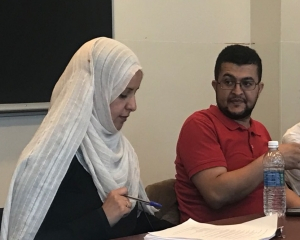Columbia Law School Human Rights Institute Honors Yemeni Human Rights Leaders with “Global Advocate Award”
Co-founders of the Mwatana Organization for Human Rights, Radhya Al-Mutawakel and Abdulrasheed Al-Faqih, visit Columbia Law School as part of Spring-Summer 2017 Practitioner-in-Residence Program

May 31, 2017, NEW YORK—Leading Yemeni human rights experts Radhya Al-Mutawakel and Abdulrasheed Al-Faqih are visiting Columbia Law School’s Human Rights Institute as part of the Spring-Summer 2017 Practitioner-in-Residence Program, and have been awarded the “Global Advocate Award” in recognition of their work to advance human rights. Al-Mutawakel and Al-Faqih co-founded the Mwatana Organization for Human Rights, a Yemen-based organization that protects human rights through fact-finding and advocacy. Their recent work has provided invaluable documentation of alleged human rights abuses by all sides to the current conflict, including by the Saudi-led coalition, Houthi forces, and the United States.
“Participating in the Practitioner-in-Residence Program with the Human Rights Institute offers us a unique opportunity to connect with U.S.-based advocates, academics, students, and government officials,” said Al-Mutawakel. “We have been able to raise awareness about the real effects of the war in Yemen and the role of the U.S. in that war, reflect on our strategies, and workshop our work with an American audience. And in our engagement with students from the Human Rights Clinic, we are able to share our strategies and advocacy with the next generation of human rights advocates.”
Mwatana conducts field investigations to monitor and document violations by all sides of the conflict in Yemen. It works to prevent and stop violations, and to promote justice for victims. Mwatana’s public outreach and trainings help to enhance awareness of human rights issues, and provide activists with the skills and knowledge to defend those rights. Al-Mutawakel serves as Chairperson of Mwatana and has been working in the field of human rights since 2004. Her work covers a range of issues including war crimes, arbitrary detentions, enforced disappearance, and freedom of the press. Al-Faqih, Mwatana’s Executive Director, has worked for several international human rights organizations including Human Rights Watch, Amnesty International, and the Open Society Foundations.
“It is an honor to have Radhya and Abdulrasheed join our human rights community of faculty, advocates, and students at Columbia Law School,” said Professor Sarah Knuckey, Faculty Co-Director of the Human Rights Institute and Director of the Human Rights Clinic. “Through a series of workshops with human rights experts and students, we have the opportunity to build greater connections between U.S. and Yemen-based advocates, form stronger international human rights coalitions, and learn from each other’s experience and expertise.”
While in residence at Columbia Law School, Al-Mutawakel and Al-Faqih co-led, with the Human Rights Institute, workshops focused on recent violations of the laws of war by various parties to the conflict in Yemen, and on fact-finding and advocacy strategies. In late April, Al-Mutawakel and Al-Faqih provided a briefing on the situation in Yemen at a two-day convening at Columbia Law School of U.S.-based policy-makers, academics, and experts. These workshops provided a space for critical reflection on the work currently being undertaken to address the conflict in Yemen. Al-Mutawakel and Al-Faqih also held numerous meetings with U.S.-based NGOs, United Nations and diplomatic representatives, and are preparing writing about the war in Yemen. At a recent UN Security Council briefing and consultation on Yemen, Al-Mutawakel was invited to brief the Council on the widespread violations of human rights and international humanitarian law throughout the conflict.
The Columbia Law School Human Rights Institute Practitioner-in-Residence Program is designed for human rights practitioners from non-governmental organizations, government, the United Nations, and other inter-governmental and international bodies who seek an environment in which they can engage in research, writing, and scholarly discussion connected to their human rights practice. The program is intended to promote human rights scholarship grounded in practice, as well as practice informed by scholarship and critique.
While in residence at the Human Rights Institute, Practitioners-in-Residence have the opportunity to work on their own scholarly or policy-oriented papers or books for publication, develop workshops and new research agendas, or prepare for conferences or new human rights projects. Mentoring about academic scholarship is available, as are opportunities for presenting and obtaining feedback on draft work. Practitioners also have the opportunity to participate in the broader intellectual life of the law school, and may deliver guest lectures in the Columbia Law School Human Rights Clinic and other human rights course offerings, participate in the mentoring of Columbia Law School students, advise on ongoing projects of the Human Rights Institute and Clinic, and design workshops or other events with experts from the field. The Human Rights Practitioners-in-Residence Program is administered by the Human Rights Institute. The “Global Advocate Award,” for practitioners from the global south, includes funds for travel to New York City to participate in the Practitioners-in-Residence Program.
# # #
The Human Rights Institute advances international human rights through education, advocacy, fact-finding, research, scholarship, and critical reflection. We work in partnership with advocates, communities, and organizations pushing for social change to develop and strengthen the human rights legal framework and mechanisms, promote justice and accountability for human rights violations, and build and amplify collective power.
Founded in 1998 by the late Professor Louis Henkin as the anchor for human rights within Columbia Law School, the Human Rights Institute promotes engagement and knowledge of human rights within the law school, throughout the University, and around world. Across the many substantive areas of its work, the Institute builds bridges between scholarship and activism, develops capacity within the legal community, engages governments, and models new strategies for progress.
Join us on Facebook: Columbia Law School and Human Rights Institute
Follow us on Twitter: @ColumbiaLaw and @CLSHumanRights
